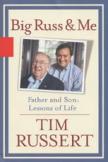A South Buffalo Start
Not long ago, an English critic and essayist, Geoffrey Wheatcroft, cast a cold eye on the rash of memoirs written by Irish Catholics from both sides of the Atlantic. Would there ever come a day, Wheatcroft wondered, when an Irish-Catholic memoirist would have something good to say about his or her faith, heritage and upbringing?
Mr. Wheatcroft, meet Tim Russert, host of the NBC program Meet the Press and one of the most important journalists in the United States.
Russert has written a lovely little book about his life and his rise from working class South Buffalo, N.Y., to the salons of Washington and New York. Big Russ & Me is designed as a father-and-son book, and at one level, it is. Big Russ is Tim Russert’s father, Tim Russert Sr., a World War II veteran who, by dint of experience and common sense, still has much to teach his famous son. But it also happens to be the sort of literary work that some of us have been longing fora book in which nuns and priests actually inspire the young people in their charge. It is also a portrait of a chapter in American life that now seems as distant as the Jazz Age.
If, for reasons best known to yourself, you are drawn to dreary recitations of childhoods betrayed by the church or Ireland or the Irish-American ghetto, skip this book. On the other hand, if you are convinced that surely there is something positive to be said about the church and those hard-working nuns who educated a generation of baby boomers and the priests who tried to transmit faith and even holiness to skeptical teenagers, Tim Russert certainly has written a book for you.
Indeed, you will take heart as Russert describes the values and lessons he learned not only from his father but also from the men and women who educated him along the way. He tells us about an energetic nun his friends dubbed Sister Kennedy because of her enthusiasm for a certain political family of that name (the nun’s real name was Sister Lucille Socciarelli). We meet Father Frank Redmond, Father John Sturm and other Jesuits who taught young Tim at Canisius High School. And, in one of the book’s most moving chapters, we get a glimpse of the man Russert calls his intellectual father, his onetime boss Daniel Patrick Moynihan.
Big Russ & Me is not a work of literature along the lines of Frank McCourt’s Angela’s Ashes or the new memoir by Dan Barry entitled Pull Me Up. The poetry of Barry’s book and the wit and grace of McCourt’s transcend the stories themselves. Russert’s book is a lot like the South Buffalo of his childhood: it is unadorned, it is not fancy, but it is effective and honest and clear.
Tim Russert was one of four children born to the Russerts of South Buffalo. Catholics who grew up in urban America in the 1960’s and early 1970’s will recognize Russert’s childhoodthe family rituals, the miracle of television, the wonder of discoveries in space, the church-centered lives, the mystery of the priests and nuns who were ever-present in their lives. It was a wonderful way to grow up, Russert writes, full of innocence and fun.
And it was filled with faith, too. Religion, Russert remembers, was everywhere in our livesnot just in church or in school, but at home, too. There were crosses above our beds, and every evening, when we sat down to supper, one of us said grace.... During the month of May, Mary’s month, we’d light a candle every day, and Mom would bring in flowers from the garden. When something in the house was misplaced, Russert’s mother offered the inevitable prayer to St. Anthony of Padua.
I suspect that not many memoirs from powerful Washington figures recall with such love and affection these rituals of a Catholic childhood, circa 1960. That’s what makes this book so genuinely sweet and likeablethere’s not a dishonest page in it. And, as if to prove the point, I noticed the utter absence of that staple of the Washington memoir, the gossipy, inside accounts of the people and players who populate the nation’s capital. The only backstage glimpse we get is Russert’s wonderful account of how he managed to persuade Pope John Paul II to offer Mass live on The Today Showand even do a promo for the show. It’s a wonderful story, and I won’t ruin it for you. Suffice to say that the Holy Father was won over, in part thanks to a scheme cooked up by Big Russ.
Tim Russert Sr. was lucky to survive a plane crash in World War II. He came home, married, had a lot of kids and worked two jobs. His story is utterly and completely familiar, and that’s a good thing. A quarter-century ago, baby boomers showed very little interest in the trials and sacrifices of their parents. Now, as parents (and even grandparents) themselves, graying boomers cherish and celebrate the heroism and dedication of the G.I. generation. In his book, Russert recalls receiving an award from the New York State chapter of the American Legion in his home town of Buffalo. He knew precisely who really deserved the award. He told the audience: It is with enormous pride, the utmost respect, and the deepest love, that I present this award to...my hero, my dad, the real Tim Russert.
A little too sugary? Perhaps, but there’s not a doubt in my mind that Tim Russert the Younger meant every word.
This article also appeared in print, under the headline “A South Buffalo Start,” in the June 7, 2004, issue.








